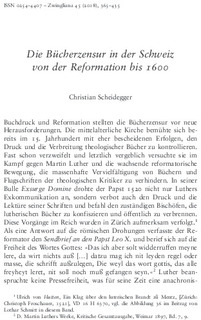Please use this identifier to cite or link to this item:
https://doi.org/10.20384/zop-4061
| Title: | Die Bücherzensur in der Schweiz von der Reformation bis 1600
|
| Authors: | |
| Editors: | |
| Type: | |
| Issue Date: | 2018
|
| License: | |
| Description: | In: Zwingliana 45 (2018), S. 365-435
|
| Abstract: | Printing and the Reformation challenged book censorship in a new dimension. The Swiss confederates did not simply adopt the papal and imperial politics of censorship but discussed own solutions, which were subsequently implemented by the particular governments in their own interests. Committees of censorships were established within the protestant cities of Zurich, Basle and Berne for proving texts before printing. This official measure was intended to avoid conflicts with other governments and to guarantee domestic peace as well. The practice however was somehow fragmentary, mainly before the middle of the 16th century. Numerous complaints were made, prominently by the catholic confederates. The complaining party demanded usually to sequester the controversial publications and to punish the accused printers and authors as a restoration of the violated honour. The Swiss Diet served repeatedly as a mediation body in settling these conflicts. The city authorities conducted investigations against printers and authors, who violated the censorship rules. Unlike printing, the authorities of the protestant cities rarely controlled bookselling, whereas the catholic governments forbade trade and possession of protestant literature. In accordance with these strict regulations they confiscated frequently forbidden books and had them burnt by the executioner.
|
| DDC: | 270 Geschichte des Christentums, Kirchengeschichte
|
| GND Subject: | |
| Theme: | |
| Publisher: | Theologischer Verlag Zürich
|
| Appears in Collections: | Publikationen von ZB-Mitarbeitenden |
Files in This Item:
| File | Description | Size | Format | |
|---|---|---|---|---|
| zwa2018-a-Scheidegger.pdf | 6.36 MB | Adobe PDF |  Preview PDFDownload |
Items in DSpace are protected by copyright, with all rights reserved, unless otherwise indicated.
